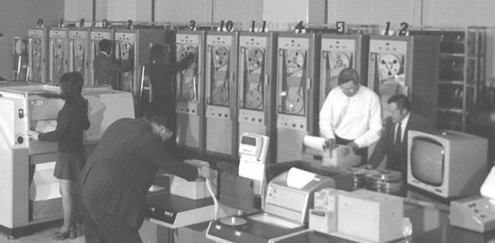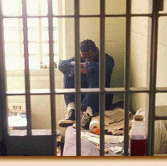 Many states have opted for oppression when it comes down to child support debt. A few wiser minds are prevailing in a few places. When the state of Maryland wanted to reach dads who were behind on their child support payments, it started in the boarded-up blocks of West Baltimore, in neighborhoods marked by drugs, violence and unemployment.
Many states have opted for oppression when it comes down to child support debt. A few wiser minds are prevailing in a few places. When the state of Maryland wanted to reach dads who were behind on their child support payments, it started in the boarded-up blocks of West Baltimore, in neighborhoods marked by drugs, violence and unemployment.
In just four zip code areas, the state identified 4,642 people who owed more than $30 million in back child support. Most of that was “state-owed,” meaning that rather than going to the child through the custodial parent, it’s supposed to reimburse taxpayers for welfare paid to the child’s mother.
This is a source of great resentment for many men, who say they want their money to go to their children. But most who owe it can’t pay anyway, as they earn less than $10,000 a year.
 “So even if we use taxpayer dollars to chase ’em down, and we catch ’em, right, and we go into their pockets, there’s nothing in there,” says Joe Jones of Baltimore’s Center for Urban Families.
“So even if we use taxpayer dollars to chase ’em down, and we catch ’em, right, and we go into their pockets, there’s nothing in there,” says Joe Jones of Baltimore’s Center for Urban Families.
Are they deadbeat?
Joseph DiPrimio, head of Maryland’s child support enforcement office, doesn’t like that expression. “I think that’s vulgar. I don’t use it,” he says. DiPrimio prefers “dead broke.”
“We’re talking about individuals that are economically challenged, they’re underemployed, but they want to do the right thing,” he says.
Unpaid child support in the U.S. has climbed to $113 billion, and enforcement agencies have given up on collecting much of it. They say too many men simply don’t have the money.
What’s more, research shows that high child-support debt can leave parents feeling so hopeless that they give up trying to pay it.
Breaking Through The Distrust
 Like a growing number of state government officials, Maryland’s DiPrimio wanted to make parents an offer. But he needed their trust, and that was a problem.
Like a growing number of state government officials, Maryland’s DiPrimio wanted to make parents an offer. But he needed their trust, and that was a problem.
Research shows high child support debt can leave parents feeling so hopeless that they give up trying to pay it.
And sting operations to round up parents who owed child support have happened all over the country, including Baltimore. In a typical ruse, agencies have sent fake letters telling parents they won tickets to a football bowl game, for instance — but when they showed up to collect, they were arrested instead.
 To break through years of distrust, Maryland sent letters to parents with the logo of the Center for Urban Families, a nonprofit in West Baltimore that provides job training and other help to poor families.
To break through years of distrust, Maryland sent letters to parents with the logo of the Center for Urban Families, a nonprofit in West Baltimore that provides job training and other help to poor families.
They made this offer: If the parent takes the center’s month-long employment training course and lands a job, the state will forgive 10 percent of his or her child support debt. If they complete a Responsible Fatherhood program, the state will write off another 15 percent. One of the first persons to sign up was a mother, though the vast majority of noncustodial parents are men.
In a separate “debt compromise” program, Maryland will also write off 50 percent of a parent’s child support debt if they maintain monthly payments for a year.
 Response has been slow. In two years, slightly more than 100 parents have signed on. Many of them attend fatherhood meetings like one held on a recent Wednesday night. Two dozen men — 20-something to middle age, in sweats and in suits — sit in a large square.
Response has been slow. In two years, slightly more than 100 parents have signed on. Many of them attend fatherhood meetings like one held on a recent Wednesday night. Two dozen men — 20-something to middle age, in sweats and in suits — sit in a large square.
Some complain their exes won’t let them see their child if they haven’t paid child support. Others don’t understand why it doesn’t count as support when they take their kids out to eat, or buy them clothes — or say they would do those sorts of things for their kids if their child support obligation wasn’t so heavy.
Mostly, like 30-year-old Lee Ford, they say it’s so hard to find work
“You telling me no matter what, I gotta pay. But I can’t get a job to work to save my soul,” he says.
Group leader Eddie White cuts no slack. “If you know you got a criminal record, sure it’s gonna be hard for you to get a job. But it don’t mean you can’t work,” White says.
A big part of this class is also educational. White asks the men what a person who is paying child support should do if he gets laid off or loses his job.
“There you go, that’s the word. Immediately,” White says. “Immediately ask the court for an adjustment.”
Other Approaches To Debt Relief
Maryland’s program is part of a larger effort to keep impoverished parents from racking up child support debt in the first place.
 Some states are trying to speed up the cumbersome process of adjusting an order when a parent loses a job. Ohio has experimented with sending simple reminders — by phone, mail or text — to parents who need to send in monthly payments. Texas has reached out to newly incarcerated parents, to let them know they can apply to have their payments reduced while in prison — something not all states allow.
Some states are trying to speed up the cumbersome process of adjusting an order when a parent loses a job. Ohio has experimented with sending simple reminders — by phone, mail or text — to parents who need to send in monthly payments. Texas has reached out to newly incarcerated parents, to let them know they can apply to have their payments reduced while in prison — something not all states allow.
“We sent out a teaser postcard trying to combat the ostrich effect,” says Emily Schmidt, a research analyst with the U.S. Administration for Children and Families, who helped with the Texas effort.
Schmidt says there was concern that someone going through the emotional transition of incarceration wouldn’t likely be thinking about child support, and may not even open a letter from the state. So they printed the postcard on blue paper to stand out, and, taking a cue from marketers, it said, “Four easy steps to lowering your child support.”
After 100 days, the response rate among parents was up 11 percent, “a very low-cost intervention for a fairly dramatic effect,” Schmidt says.
 The Obama administration wants to “right size” child support orders from the start, and has proposed regulations to make sure they are set according to what parents actually earn. Officials say some jurisdictions base orders on a full-time minimum wage, even if a parent earns far less. They say this can backfire, leaving so little money after a parent’s wages are garnished that he or she quits and works underground instead.
The Obama administration wants to “right size” child support orders from the start, and has proposed regulations to make sure they are set according to what parents actually earn. Officials say some jurisdictions base orders on a full-time minimum wage, even if a parent earns far less. They say this can backfire, leaving so little money after a parent’s wages are garnished that he or she quits and works underground instead.
The White House’s proposals also would provide more job training for parents with child support debt — something Ron Haskins of the Brookings Institution says is a good investment.
“More fathers will get a job, more fathers will have earnings, and more fathers will use those earnings to pay child support,” he says.
So far, that’s what’s happened in Baltimore. The numbers are small. But the amount of child support that’s been paid is more than double the amount of debt written off.
Maryland wants to expand its child support debt forgiveness program, hoping to help more parents to pay what they can.

 As an American Citizen, you want to believe that any person can rely upon judicial fairness in a child support proceeding. The outrageous child support law on the books today is designed to treat all child support debtors like a piece of garbage. The wisdom of common sense, respect, judicial fairness, doesn’t exist under the present law. The mastermind of this unconscionable child support enforcement law was created by former Senator Bill Bradley of New Jersey.
As an American Citizen, you want to believe that any person can rely upon judicial fairness in a child support proceeding. The outrageous child support law on the books today is designed to treat all child support debtors like a piece of garbage. The wisdom of common sense, respect, judicial fairness, doesn’t exist under the present law. The mastermind of this unconscionable child support enforcement law was created by former Senator Bill Bradley of New Jersey. I would like to focus on the requirement of proof of substantial change in circumstances necessary in requesting a review of child support outside 3-year cycle. The law offers no guidance whatsoever on what constitutes a substantial chance in circumstances. Similarly, the Office of Child Support Enforcement offers no guidance either. With no guidance whatsoever, the law requires payments to be maintained without regard of a citizen’s ability to pay.
I would like to focus on the requirement of proof of substantial change in circumstances necessary in requesting a review of child support outside 3-year cycle. The law offers no guidance whatsoever on what constitutes a substantial chance in circumstances. Similarly, the Office of Child Support Enforcement offers no guidance either. With no guidance whatsoever, the law requires payments to be maintained without regard of a citizen’s ability to pay. My researched has revealed that most Americans are unaware that our federal government reimburses States 66% of collection cost expended for child support enforcement, see Title IV under the Social Security Act. This doesn’t bother me, but the additional incentive dollars the States receive to treat citizens like garbage does. Under Title IV:
My researched has revealed that most Americans are unaware that our federal government reimburses States 66% of collection cost expended for child support enforcement, see Title IV under the Social Security Act. This doesn’t bother me, but the additional incentive dollars the States receive to treat citizens like garbage does. Under Title IV: So regardless of a child support debtors changed financial circumstances, a family court judge will routinely deny any request for a reduction or, even a temporary reduction. The unfortunate truth, family court judges armed with physic abilities to determine a citizen’s earning abilities, don’t care. They are the front line in defending the State’s performance incentives. A family court judge will bully a citizen by denying any type of relief sought, suspend your driver’s license, professional license, passport, may incarcerate you for failure to pay child support without a finding of ability to pay, intercept your tax return, garnish your unemployment or workman’s compensation, destroy your credit, and your home State will receive additional incentive dollars from our federal government for doing this to you. This is not only insane, cruel, unconscionable, but definitely creates an appearance of impropriety.
So regardless of a child support debtors changed financial circumstances, a family court judge will routinely deny any request for a reduction or, even a temporary reduction. The unfortunate truth, family court judges armed with physic abilities to determine a citizen’s earning abilities, don’t care. They are the front line in defending the State’s performance incentives. A family court judge will bully a citizen by denying any type of relief sought, suspend your driver’s license, professional license, passport, may incarcerate you for failure to pay child support without a finding of ability to pay, intercept your tax return, garnish your unemployment or workman’s compensation, destroy your credit, and your home State will receive additional incentive dollars from our federal government for doing this to you. This is not only insane, cruel, unconscionable, but definitely creates an appearance of impropriety. The last time I checked, the 14th Amendment prohibits States from denying any person within its territory the equal protection of the laws. The federal government must do the same, but this is also required by the 5th Amendment Due Process Clause. All citizens should be entitled to judicial fairness in any court proceeding. I urge all citizens to write their elected officials and asked them to repeal this unconscionable law. Alternatively, send your elected official a strong message and vote them out of office. A debtor citizen cannot rely upon judicial fairness in a family court proceeding, if a State has a financial interest in maintaining additional incentives dollars.
The last time I checked, the 14th Amendment prohibits States from denying any person within its territory the equal protection of the laws. The federal government must do the same, but this is also required by the 5th Amendment Due Process Clause. All citizens should be entitled to judicial fairness in any court proceeding. I urge all citizens to write their elected officials and asked them to repeal this unconscionable law. Alternatively, send your elected official a strong message and vote them out of office. A debtor citizen cannot rely upon judicial fairness in a family court proceeding, if a State has a financial interest in maintaining additional incentives dollars.
 Thousands of Arizona residents that paid off their child support debt continued to be marked as subject to property liens because of a state Department of Economic Security screwup. The ongoing furor finally drove the agency to do something about the problem, according to insiders. Dozens of people had to be hired to help figure it out. Officials say the problem is “almost fixed.”
Thousands of Arizona residents that paid off their child support debt continued to be marked as subject to property liens because of a state Department of Economic Security screwup. The ongoing furor finally drove the agency to do something about the problem, according to insiders. Dozens of people had to be hired to help figure it out. Officials say the problem is “almost fixed.” The state has about 321,000 active child support cases, with the state and county splitting them roughly in half. Besides typical cases, the state automatically receives cases that involve federally assisted foster care, as well as recipients of Medicaid or welfare. Under previous rules, if someone ordered to pay child support were to fall more than two months behind, an administrative lien would be placed on all current and future property they own. (The state recently changed that to four months.) It is claimed that the lien prevents the person from selling the property, typically a home, until the past-due payments are satisfied. That isn’t exactly true as long as the payment is made before the house closes. If a parent who paid the past-due amount attempts to buy or sell and home and finds that a lien hasn’t been released, a title or mortgage company can submit a request to DES’ Division of Child Support Services, which sends the proper information to the companies “within 48 hours.”
The state has about 321,000 active child support cases, with the state and county splitting them roughly in half. Besides typical cases, the state automatically receives cases that involve federally assisted foster care, as well as recipients of Medicaid or welfare. Under previous rules, if someone ordered to pay child support were to fall more than two months behind, an administrative lien would be placed on all current and future property they own. (The state recently changed that to four months.) It is claimed that the lien prevents the person from selling the property, typically a home, until the past-due payments are satisfied. That isn’t exactly true as long as the payment is made before the house closes. If a parent who paid the past-due amount attempts to buy or sell and home and finds that a lien hasn’t been released, a title or mortgage company can submit a request to DES’ Division of Child Support Services, which sends the proper information to the companies “within 48 hours.” At terminals with green monochrome monitors, workers over the years tracked only court-ordered liens in the archaic computer system, then later switched to tracking both court-ordered and the DES administrative liens, confusing the process. The old system could only store a few cases for a limited time so older cases were constantly archived on magnetic tape.
At terminals with green monochrome monitors, workers over the years tracked only court-ordered liens in the archaic computer system, then later switched to tracking both court-ordered and the DES administrative liens, confusing the process. The old system could only store a few cases for a limited time so older cases were constantly archived on magnetic tape. Mothers who make no effort to identify father of their children could have a cap on the number of years in which they can go back and seek child support.
Mothers who make no effort to identify father of their children could have a cap on the number of years in which they can go back and seek child support. A law suit challenging New Jersey’s automatic suspension of driver’s licenses for child support arrears says that the Division of Family Development misled lawmakers to convince them that the program is a success.
A law suit challenging New Jersey’s automatic suspension of driver’s licenses for child support arrears says that the Division of Family Development misled lawmakers to convince them that the program is a success. Nearly four decades of mass incarceration and over-criminalization have made the United States the world leader in incarceration and arrests. The number of Americans in federal and state prisons and jails has quintupled over the past four decades. As a result, nearly 2.3 million Americans are behind bars today. The U.S. incarceration rate is at more than six times the average across developed nations. “Communities of color” and “men of color” are hit hardest, with black men six times more likely and Latino men two-and-a-half times more likely to be incarcerated than white men.
Nearly four decades of mass incarceration and over-criminalization have made the United States the world leader in incarceration and arrests. The number of Americans in federal and state prisons and jails has quintupled over the past four decades. As a result, nearly 2.3 million Americans are behind bars today. The U.S. incarceration rate is at more than six times the average across developed nations. “Communities of color” and “men of color” are hit hardest, with black men six times more likely and Latino men two-and-a-half times more likely to be incarcerated than white men. While the effects of parental incarceration on children and families are well-documented, less appreciated are the family consequences that stem from the barriers associated with having a criminal record. A child’s life chances are strongly tied to his or her circumstances during childhood. Thus, these barriers may not only affect family stability and economic security in the short term but also may damage a child’s long-term well-being and outcomes.
While the effects of parental incarceration on children and families are well-documented, less appreciated are the family consequences that stem from the barriers associated with having a criminal record. A child’s life chances are strongly tied to his or her circumstances during childhood. Thus, these barriers may not only affect family stability and economic security in the short term but also may damage a child’s long-term well-being and outcomes. Many states have opted for oppression when it comes down to child support debt. A few wiser minds are prevailing in a few places. When the state of Maryland wanted to reach dads who were behind on their child support payments, it started in the boarded-up blocks of West Baltimore, in neighborhoods marked by drugs, violence and unemployment.
Many states have opted for oppression when it comes down to child support debt. A few wiser minds are prevailing in a few places. When the state of Maryland wanted to reach dads who were behind on their child support payments, it started in the boarded-up blocks of West Baltimore, in neighborhoods marked by drugs, violence and unemployment. “So even if we use taxpayer dollars to chase ’em down, and we catch ’em, right, and we go into their pockets, there’s nothing in there,” says Joe Jones of Baltimore’s Center for Urban Families.
“So even if we use taxpayer dollars to chase ’em down, and we catch ’em, right, and we go into their pockets, there’s nothing in there,” says Joe Jones of Baltimore’s Center for Urban Families. Like a growing number of state government officials, Maryland’s DiPrimio wanted to make parents an offer. But he needed their trust, and that was a problem.
Like a growing number of state government officials, Maryland’s DiPrimio wanted to make parents an offer. But he needed their trust, and that was a problem. To break through years of distrust, Maryland sent letters to parents with the logo of the Center for Urban Families, a nonprofit in West Baltimore that provides job training and other help to poor families.
To break through years of distrust, Maryland sent letters to parents with the logo of the Center for Urban Families, a nonprofit in West Baltimore that provides job training and other help to poor families. Response has been slow. In two years, slightly more than 100 parents have signed on. Many of them attend fatherhood meetings like one held on a recent Wednesday night. Two dozen men — 20-something to middle age, in sweats and in suits — sit in a large square.
Response has been slow. In two years, slightly more than 100 parents have signed on. Many of them attend fatherhood meetings like one held on a recent Wednesday night. Two dozen men — 20-something to middle age, in sweats and in suits — sit in a large square. The Obama administration wants to “right size” child support orders from the start, and has proposed regulations to make sure they are set according to what parents actually earn. Officials say some jurisdictions base orders on a full-time minimum wage, even if a parent earns far less. They say this can backfire, leaving so little money after a parent’s wages are garnished that he or she quits and works underground instead.
The Obama administration wants to “right size” child support orders from the start, and has proposed regulations to make sure they are set according to what parents actually earn. Officials say some jurisdictions base orders on a full-time minimum wage, even if a parent earns far less. They say this can backfire, leaving so little money after a parent’s wages are garnished that he or she quits and works underground instead.